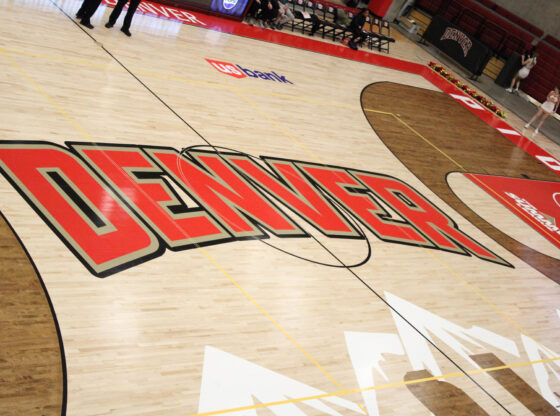On March 14, Chief of Campus Safety Mike Bunker outlined his primary goals for the department. He discussed how he wants to build a stronger relationship with the community and new proactive initiatives to make the campus safer.
“Our goal is to build a community of trust through partnerships, transparency and fairness,” Bunker said.
Back in March, several cars and a home near DU’s campus were vandalized with hateful, antisemitic graffiti. The Hillel House, a “home away from home” for Jewish students, operates near the crime scene.
Chief Bunker and his Director of Community Engagement, Julianne Toce, had spent much time there, discussing safety with the students. Campus safety works with many affinity groups to ensure students know how and where to report signs of hate.
“The key is making sure students feel comfortable reporting,” Bunker said.
Even though Bunker and his team are restricted to campus, they report hate crimes committed in the surrounding area to the FBI and the DPD. The chief believes fostering the relationship with the FBI and DPD will help make DU’s community safer.
“I’ve been here two and a half years, and my goal’s been, like, I will knock down every door to find out whoever we have to meet, cause we are a campus safety department, not a campus police department, so we’re unique, we really have to barge our ways into doors,” Bunker said.
In another effort to reduce crime, campus safety has hired several Denver police officers to patrol areas immediately adjacent to campus. They patrol the streets of Buchtel Blvd, Evans Ave, University Blvd and especially around places students frequent, like The Pioneer bar and the RTD light rail station.
Chief Bunker wants these officers to focus on keeping students safe. “They have yet to write one ticket for a student drinking underage; that’s not their goal.” He continued, “The goal is to ensure you all, as students, have a safe environment immediately adjacent to campus.”
The officer’s presence has also helped reduce response times for DPD to under five minutes for areas around campus.
Last Spring, DU hired Margolis Healy, an independent security advising company, to evaluate campus safety. Student government, affinity groups and Greek life were invited to on-campus events, where Margolis Healy asked them to give their input and discuss issues.
Margolis Healy collected data and made several recommendations. One piece of advice was implementing a Campus Safety Advisory Council to examine safety policy, procedures and crime trends. The goal of the 16-member council, which comprises faculty and student representatives, is to incorporate community feedback into Campus Safety.
Chaired by Senior Vice Chancellor Julia Richmond, the committee invites both USG and GSG representatives to attend. The committee’s faculty representatives have different areas of expertise; some come from the law school, and others have a background in the DEI space.
“The council is pretty diverse, we wanted it to be reflective of what the campus is,” said Bunker.
Campus safety appointed a day shift sergeant to attend the meetings and provide the council with any specific information on day-to-day Campus Safety operations. Chief Bunker sees the meetings as a way to improve.
“I’m very open to feedback,” he said. “Let them imagine different creative ways for us to be seen on campus.”
Margolis Healy also noted campus safety needed more engagement with the community. As a result, Toce was hired in December of 2023 as Campus Safety’s Director of Community Engagement. Toce did not have a background in campus safety prior to taking on the role.
“One of the ways to really work on that was to have someone like [Julianne] who comes with a student affairs background prior to taking on this role,” Bunker said.
Toce and Bunker have created new initiatives to foster a better relationship with the community. Students are invited to safety lighting walks with officers to discuss safety. There are also family dinners, where different RSO groups are invited to have lunch or dinner in the campus safety office.
“We kind of discuss safety in general, and get to know them a bit better, and let them get to know us better,” Bunker said.
Ultimately, campus safety would like to build trust in its community by increasing visibility. Bunker says his personal challenge is getting to know students better.
“I don’t think we get to know enough of you, or when we do, it’s in a moment of crisis,” he said. “We need to be out there more.”
Bunker wants students to feel safe when they see officers, not threatened or worried they’ll get a ticket. “That’s really not what we are about; we’re never gonna write a ticket,” he said.
Campus Safety has a proprietary app called DU Safe that allows students to request virtual escorts around campus.
“There are a lot of students who don’t feel comfortable getting into a campus safety car, so they send a request, and what we do is virtually monitor them getting from point A to point B and make sure they are safe,” Bunker said.
The app also allows students to make anonymous reports if they see suspicious activity on campus. The reports go directly to dispatchers.
“We gotta realize that some of our students are not gonna be comfortable calling a campus safety number, or they may not want to tell on a friend, but they know that their friend needs help, so this allows them to do it,” said Bunker.
The app also sends any safety-related alerts directly to students’ phones. Students can download DU Safe from the Apple and Google Play app stores.
Campus Safety will continue finding ways to better support students in their safety needs and trying to build trust in the community.











